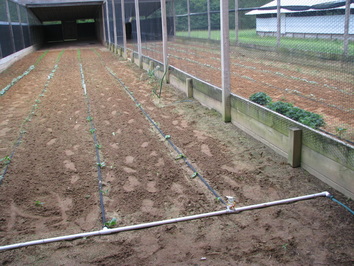
Since we no longer raise quail for commercial hunting preserves, we decided to use the flight pens for gardening. It really makes a great place for this since it is all enclosed and the deer cannot get to it and the soil has been organically fertilized by quail droppings over the years. We attached a total of 8 soaker hoses to pvc pipe connections so that we can water the whole garden with a turn of a valve. This is an improvement over last year's sprinklers.
In the foreground I have cucumbers, zuchini and yellow squash. Midway down are peas and at the end is corn. On the other side, we have a long row of tomatoes and more peas, peppers, okra and green beans. There are a few strawberry plants that you see just on the other side that we planted last year and they are spreading this year. I used organic seeds and plan on raising this garden without herbicides or pesticides so I'm in for a lot of work. The picture reveals a freshly tilled ground and you can see my foot tracks.
Most of our country's produce comes to us from long distances. According to The Packer website on fresh produce, the top supplier of vegetables to the U.S. is Mexico. That means from where I live that produce would have to travel around 1,000 miles from the field to my table and I wonder how many hands had to touch it and how many pesticides and herbicides were used.
LiveStrong.com in their post entitled "how to avoid fruits and vegetables from Mexico sprayed with chemicals states that, "Prolonged exposure to pesticides has been shown to increase your chances of cancer, neurological and developmental problems and a weakened immune system, says Dr. Charles Benbrook in an interview conducted for "Nutrition Action Newsletter." Avoiding foods that have been treated with pesticides in Mexico may take some effort, but doing so protects you and your family's health. Pesticide use in Mexico is not as regulated as it is in the United States, and some farmers don't understand the correct dosage to apply to their crops. Choosing produce from alternative sources may be safer."
The site goes on to list 5 ways to choose produce wisely. 1. Avoid produce from Mexico, 2. Buy organic fruits and vegetables, 3. Buy locally - many local farmers grow their produce without pesticides or herbicides but cannot afford to get the organic status. You would need to inquire about how the vegetables and fruits were raised to be sure, 4. Wash your produce no matter where it comes from and 5. Dine at restaurants willing to tell you where they purchase their produce.
I hope that if you have a garden, it will be very successful. I will keep you posted on what happens with my garden through the summer. I have already seen a couple of things I would correct but since it is up and growing I will leave it as it is and just learn from it for a better next season.
Gardening supplies I use.

